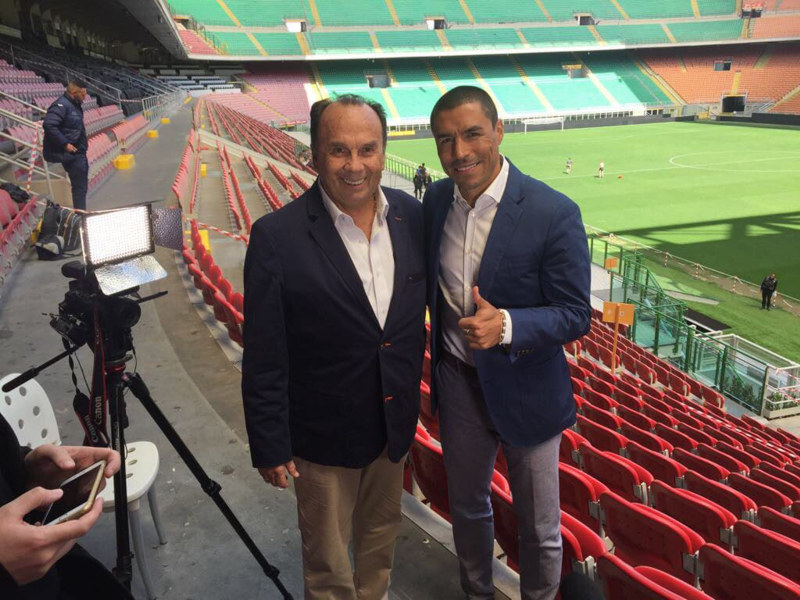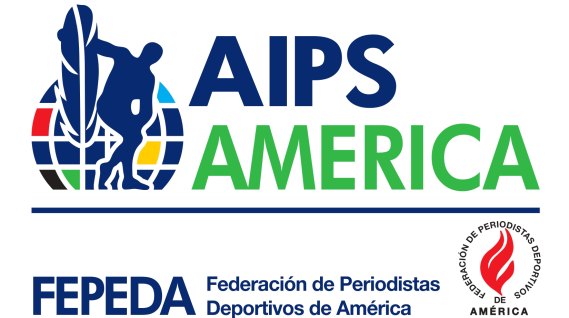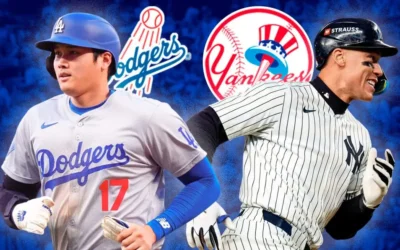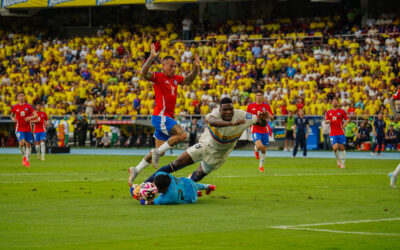Por: Constanza Mora Pedraza – Miembro AIPS
BOGOTÁ, Colombia, 20 de junio de 2018.- Su amor por el fútbol nació desde que era un joven universitario; jugaba de 10, pero una lesión de rodilla lo marginó de su deporte favorito. Sin embargo, su vida terminaría de todos modos girando alrededor de un balón y es, hoy día, sin duda alguna el periodista deportivo más reconocido de Colombia. Su conocimiento ha pasado por generaciones, llegando a ser considerado por muchos, como su mentor en esta profesión. Se inició como invitado especial en una emisora de su natal Cali cuando tenía 21 años, y poco a poco el amor por el periodismo fue creciendo, hasta el punto de dejar de lado la Ingeniería Química, su profesión académica. En la actualidad, con más de 50 años en los medios sigue siendo uno de los más grandes referentes y aunque con menos intensidad, aún hace parte de programas radiales y trabaja como comentarista en televisión.

Hernán Peláez (izq.) junto a Víctor Hugo Aristizábal, en su segunda casa, un campo de fútbol. / Hernán Peláez (left) with Víctor Hugo Aristizabal, in his second home, a football field.
-¿Qué es lo que más le gusta del periodismo deportivo?
-La información y su derivada inmediata como es la opinión. Estar en contacto con las partes de ese entramado y generoso que es el deporte. Además, genera sentimientos en quien oye periodismo deportivo.
-¿Cuáles son los máximos desafíos que el periodismo deportivo actual debe enfrentar?
-El mayor desafío es conocer la verdad y poder difundirla, sabiendo cómo eliminar las noticias falsas y las especulaciones. La velocidad en redes sociales, internet, son tentaciones que atentan contra la credibilidad que debe poseer el periodista deportivo.
Su legado es indiscutible, “Hernán es una persona maravillosa, la verdad es que tuve el honor de compartir con él en este trabajo radial, no solamente en el Pulso del Fútbol, (uno de los programas radiales de más audiencia en Colombia), sino en varios programas, y también en su vida privada cuando tuvimos la oportunidad de viajar a algún partido, y pude encontrar en Hernán ese ser humano tranquilo, distendido que mira las cosas con mucha tranquilidad y con mucha madurez. La verdad que para mí fue un orgullo haber podido compartir con él y haberlo conocido. La admiración que Hernán despierta en el país no es gratuita es ganada a lo largo de tantos años de su gran capacidad profesional, pero créanme que como persona es más que como ser profesional” son las palabras de Rafael Villegas, Director de www.colombiasports.com y quien trabajó durante muchos años con Peláez.
Ha sido prácticamente toda una vida en esta profesión, por lo que al preguntarle cuál es la mejor o más reconfortante cobertura que haya hecho y por qué, su respuesta es contundente “Es difícil en tanto tiempo elegir determinada actuación. En todos los medios, radio tv o impresos, haber tenido la premisa presente de hacer bien el trabajo. Con honradez y rigor periodístico”.
-¿Qué cosas aprendió en esta profesión que quiera compartir con otros?
-Ser ponderado, certero y preciso. Haber aprendido a manejar los diferentes lenguajes para cada medio. La noticia es una sola. Interpretarla es un ejercicio que debe hacerse pensando en quién la va a recibir… cómo contarla.
Para Hernán Peláez, a quien se le conoce más como el ‘Doctor Peláez’, la situación actual del Periodismo Deportivo en Colombia, “es la misma en todas partes. La globalización nos ha llevado a ese terreno. Es saber interpretar el periodismo genuinamente. Cada día disponemos de más recursos y ayudas. Es un señuelo, pero desmenuzarlo es nuestro deber”.
Los AIPS Sport Media Award, son para Hernán Peláez un estímulo. Este periodista, quien recibió el Premio “Abelardo Raidi” otorgado por AIPS América, expresó, “Me parece necesario, como estímulo para los profesionales del medio. Y de paso la ocasión de cotejar con otras plumas o comunicadores, lo que uno está haciendo. De hecho, conocer nuevos modelos e interpretaciones del oficio, además, las nuevas generaciones pueden ver y conocer espejos o modelos para su trabajo”.
-¿Cuáles son sus medios favoritos y en qué formato los consume normalmente?
-Tablet e impresos. Y estoy inclinado siempre a conseguir, en mi caso, hoy que tanto se ve, libros sobre fútbol. Conocer biografías, análisis (tipo Valdano) y el claroscuro que ofrece el mundo del balón.
–¿Qué es lo que hoy le gustaría decirse a usted mismo, cuando estaba empezando en el periodismo? ¿Qué consejo se daría?
-Estudiar, conocer el tema, apasionarse por él. Haber conocido de alguna manera, el deporte del cual voy a conseguir ideas, para “saber de qué estoy hablando”.
“La Radio siempre fue el lugar donde me sentí mejor. Porque nací con ella y me acostumbré a estar en contacto con muchos oyentes. Lo disfruto y como cualquier jugador de cualquier deporte… disfrutar y no sufrir por un resultado. Uno debe sentirse bien, pleno con lo que hace”.
Las fake news están a la orden del día, pero Peláez no recuerda haber sido víctima de esta situación, “Que recuerde, no. Por supuesto que, con oídos atentos, uno oye de todo y debe tener un cedazo o un tamiz, para hurgar en la verdad. Sólo así se puede confiar en el manejo de la noticia”.
Es un activo tuitero, su cuenta tiene más de 280 mil seguidores y para él, estar conectado a esta red social, no ha hecho más o menos fácil la profesión, “Veo esa relación, como una ayuda. Una crítica, una observación y de hecho una fuente para construir una historia periodística”.
———-
ENGLISH:
HERNÁN PELÁEZ, OVER 50 YEARS AS A SPORT JOURNALIST
By: Constanza Mora Pedraza – AIPS Member
BOGOTA, Colombia, June 20, 2018.- His love for football began since he was a young college student, he played as 10 at the team, but a knee injury stopped all his dreams in his favorite sport. However, his life would end up around a foot-ball and is, today, without a doubt the most recognized sports journalist in Colombia. His knowledge has gone through generations, to be considered by many as his mentor in this profession. He started as a special guest at a radio station in his native Cali, when he was 21, and by the time the love for journalism grew, to the point of leaving aside Chemical Engineering, his academic profession. Nowadays, with more than 50 years in the media, he is still one of the greatest references and, although with less intensity, he is still part of radio programs and works as a television commentator.
–What do you like most about sports journalism?
-The information and its immediate derivative which is the opinion. Being in touch with the parts of that framework that is the sport. In addition, it generates feelings in those who hear sports journalism.
–What are the challenges that current sports journalism must face?
-The biggest challenge is knowing the truth and being able to spread it, knowing how to eliminate false/fake news and speculation. The speed in social networks, internet, are temptations that undermine the credibility that the sports journalist must possess.
His legacy is indisputable, «Hernán is a wonderful person, the truth is that I had the honor of sharing with him in radio work, not only in the ‘Pulso del Fútbol’ (one of the radio programs with more audience in Colombia), but in several programs, and also in his private life when we had the opportunity of traveling to events, and I was able to find in Hernán that calm and relaxed human being who looks at things very calmly and with a lot of maturity. The truth is, that for me was a pride to have been able to share with him and have known him. The admiration that Hernán has in the country is not free, it has been gained over so many years of his great professional capacity, and believe me as a person is more than a professional», this are the words of Rafael Villegas, www.colombiasports.comDirector and who worked for many years with Peláez.
He has spent practically a lifetime in this profession, so when asked which is the best coverage he has done and why, his answer is forceful, «In all this time, it is difficult to choose a certain event. In all media, radio or print, having had present the premise of doing the job well. With honesty and journalistic rigor”.
–What things did you learn in this profession that you want to share with others?
-To be careful, accurate and precise. To learn to handle different languages for each media. The news is one and how to tell them. Interpreting it is an exercise that must be done thinking about who will receive it.
For Hernán Peláez, who is known as ‘Doctor Peláez’, his opinion about the current situation of Sports Journalism in Colombia is clear, «Is the same everywhere. Globalization has taken us to that. It is knowing how to interpret journalism genuinely. Every day we have more resources and help. It’s a decoy, but breaking it down is our duty».
The AIPS Sport Media Award, are, for Hernán Peláez a stimulus; he who received the “Abelardo Raidi” Award granted by AIPS America, said: «I think it is necessary, as a stimulus for the media professionals. And of course is the opportunity to check with other pens or communicators, what we are doing. In fact, knowing new models and interpretations of the job, in addition, new generations can see and know mirrors or models for their work.
–What are your favorite media and in what format do you usually use them?
-Tablet and printed. And I’m always inclined to get, in my case, today that you see so much, books about football such as biographies, analysis (Valdano type) and all kind offered by the ball world.
–What is it that you would like to say today, when you were starting in sports journalism? What advice would you say?
-Study, know the subject, be passionate about it. Having known in some way, the sport of which I will get ideas, know what I’m talking about.
«Radio was always the place where I felt better. Because I was born with it and I got used to being in contact with many listeners. I enjoy it like any player in any sport … enjoy and not suffer for the result. We must feel good and full with what we do.
The fake news are at the order of the day, but Peláez does not remember being a victim of this, «I do not remember! Of course, with attentive ears, we hear everything and we must have a sieve, to rummage into the truth. Only like this, we ca trust the handling of the news».
He is an active Twitter user, his account has more than 280 thousand followers, and for him, being connected to this social network, has not made the profession more or less easy, » I see that relation as an aid. A criticism, an observation and in fact a source to build a journalistic history».



